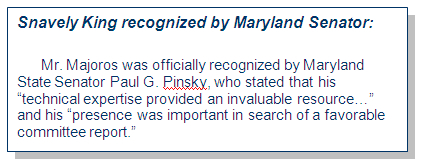Environmental Consulting
Snavely King successfully conducted a number of projects relating to environmental protection. Snavely King President Michael J. Majoros, Jr. provided analytical assistance to and appeared as an expert on behalf of the EPA in a proceeding before an EPA Administrative Law Judge. The EPA contended that the Tennessee Valley Authority (TVA) had violated the Clean Air Act (CAA 1970) by modifying, without prior approval and without installing required air pollution controls, several of its older coal-fired electric power generating units. Mr. Majoros analyzed 14 major plant projects that TVA had undertaken. He provided expert opinions relevant to TVA’s contention that these projects represented “routine maintenance, repair and replacement” as described in §52.21(c)(2)(iii)(a) as opposed to “major modifications” within the meaning of § 52.21(c)(2)(i) of the EPA’s rules. A significant portion of his testimony dealt with the interpretation and reconciliation of EPA concepts such as “routine maintenance” with electric industry regulatory accounting norms. Mr. Majoros’ testimony and exhibits were found to be useful in the Final Order on Reconsideration in that proceeding (EPA CAA-00-6).
 EPA CAA Docket No. 00-6 spawned two lawsuits filed in 2001 by the Sierra Club, NPCA, and Our Children’s Earth Foundation, which focused on the specific projects at TVA’s Colbert and Bull Run power plants. In 2005, Mr. Majoros again provided expert testimony on the “routine maintenance” issue as well as electric generating plant lives. (US Dist. CT, Northern District of AL, NW Division – CV01-B-403 NW)
EPA CAA Docket No. 00-6 spawned two lawsuits filed in 2001 by the Sierra Club, NPCA, and Our Children’s Earth Foundation, which focused on the specific projects at TVA’s Colbert and Bull Run power plants. In 2005, Mr. Majoros again provided expert testimony on the “routine maintenance” issue as well as electric generating plant lives. (US Dist. CT, Northern District of AL, NW Division – CV01-B-403 NW)
State Environmental Experience
In 2006 Mr. Majoros appeared as an expert witness before both houses of the Maryland legislature regarding the Maryland Healthy Air Act (“SB 154” and “HB 189” respectively), and specifically the seven affected power plants in Maryland.
Mr. Majoros’ comments and underlying analytical exhibits demonstrated that these seven plants produced sufficient profit margins to enable them to absorb the additional capital costs and operating expenses associated with the controls needed to meet the provisions for the Healthy Air Act. The Maryland legislature passed the Healthy Air Act into law.





